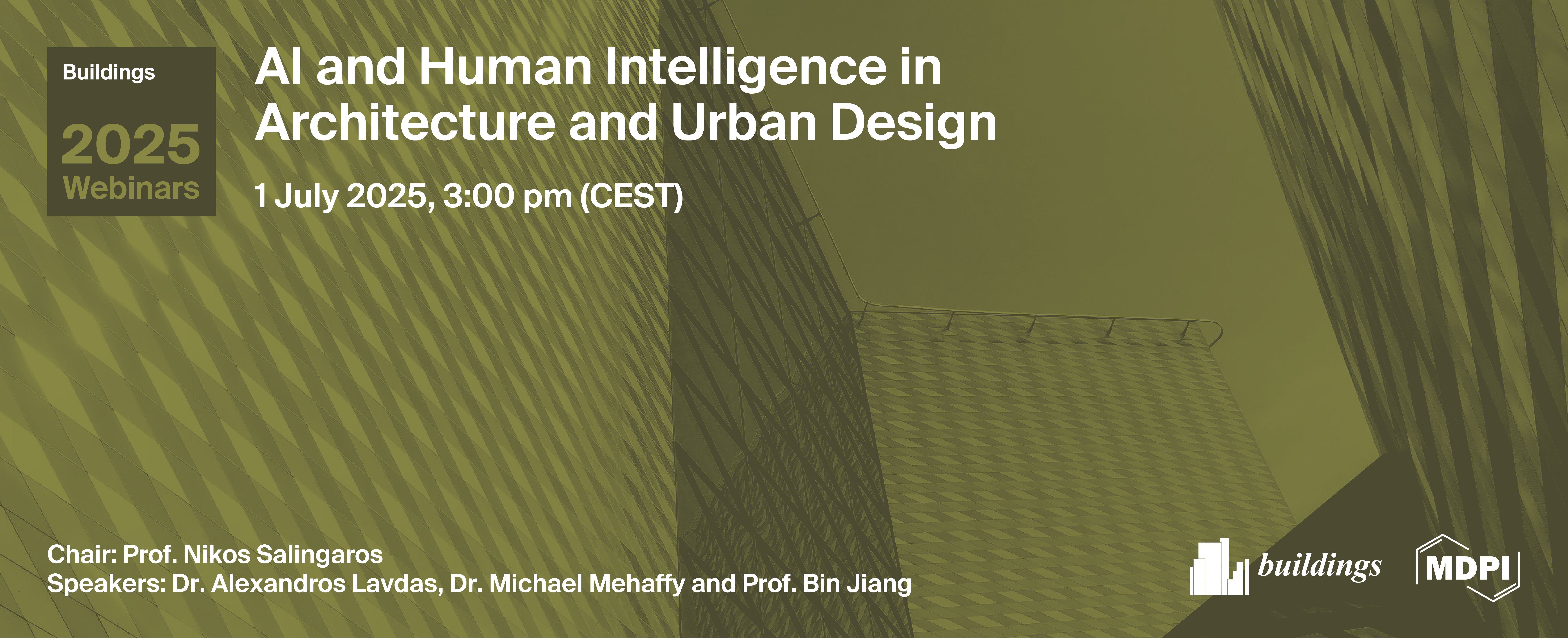
Journal Menu
► ▼ Journal Menu-
- Buildings Home
- Aims & Scope
- Editorial Board
- Reviewer Board
- Topical Advisory Panel
- Instructions for Authors
- Special Issues
- Topics
- Sections & Collections
- Article Processing Charge
- Indexing & Archiving
- Editor’s Choice Articles
- Most Cited & Viewed
- Journal Statistics
- Journal History
- Journal Awards
- Society Collaborations
- Conferences
- Editorial Office
Journal Browser
► ▼ Journal BrowserNeed Help?
Announcements
26 June 2025
Buildings Webinar | AI and Human Intelligence in Architecture and Urban Design, 1 July 2025

Welcome to this webinar addressing the powerful forces reshaping the fields of architecture and urban design. The world is entering a technological revolution because AI is merging with human expertise and productivity. This drastic change is expected to radically transform how we design and erect buildings, leading to a paradigm shift. Despite this, the mainstream profession is still unsure of exactly how AI is creating a design revolution. We believe that this change should implement human-centred design that promotes health and well-being, rather than continuing to produce iconic buildings as abstract forms. Recent developments in neuroscience will, therefore, determine the future of AI-based architecture, leaving behind the outdated typologies that now dominate architectural education and the building trade.
To gain insights into the coming revolution, we decided to bring together experts in design from outside the architectural mainstream. This is essential for an unbiased perspective that draws upon the latest scientific results on how buildings affect users in both the short- and long-term. A vast amount of relevant data is accessible to AI and large language models, and it is already used by a few design pioneers today. The dominant architectural culture, however, continues with its abstract image-based paradigm and is co-opting AI simply to create ever-more fantastical forms without considering their effects on users. We expect that clients and decision-makers will soon ask for healing environments and will stop commissioning buildings proven to create alarm and distress, even if they are favoured by the mainstream media for reasons of fashion and prestige.
A major revolution is coming in how the built environment will look in the near future. This new appearance will, surprisingly, be rather traditional. The reason for this renaissance is neither nostalgia nor a return to the past, but due to paying attention to science-based data on health and well-being. In this major project facilitated by the latest advances in AI, the architecture and buildings of the future will be amalgamated with public health needs.
Date: 1 July 2025 at 3:00 p.m. CEST | 9:00 a.m. EDT | 9:00 p.m. CST Asia
Webinar ID: 819 2967 9878
Website: https://sciforum.net/event/Buildings-8
Program:
|
Speaker |
Presentation Title |
Time in CEST |
Time in EDT |
Time in CST Asia |
|
Prof. Nikos Salingaros |
Chair’s Introduction |
3:00–3:10 p.m. |
9:00–9:10 a.m. |
9:00–9:10 p.m. |
|
Dr. Alexandros Lavdas |
AI as a Tool for Architecture Research |
3:10–3:30 p.m. |
9:10–9:30 a.m. |
9:10–9:30 p.m. |
|
Dr. Michael Mehaffy |
AI, Network Science, and Lessons for a New Architecture |
3:30–3:50 p.m. |
9:30–9:50 a.m. |
9:30–9:50 p.m. |
|
Prof. Bin Jiang |
Living Structures and AI-Inspired Architectural and Urban Design |
3:50–4:10 p.m. |
9:50–10:10 a.m. |
9:50–10:10 p.m. |
|
|
Q&A Session |
4:10–4:25 p.m. |
10:10–10:25 a.m. |
10:10–10:25 p.m. |
|
Prof. Nikos Salingaros |
Closing of Webinar |
4:25–4:30 p.m. |
10:25–10:30 a.m. |
10:25–10:30 p.m. |
After registering, you will receive a confirmation email containing information on how to join the webinar. Registrations with academic institutional email addresses will be prioritized.
Unable to attend? Register anyway, and we will let you know when the recording is available to watch.
Webinar Chair and Keynote Speakers:
- Prof. Nikos Salingaros, Department of Mathematics, The University of Texas at San Antonio, USA;
- Dr. Alexandros Lavdas, Eurac Research, Institute for Biomedicine, Affiliated Institute of the University of Lübeck, Italy;
- Dr. Michael Mehaffy, Sustasis Foundation, Arizona State University, USA;
- Prof. Bin Jiang, Hong Kong University of Science and Technology (Guangzhou), China.




